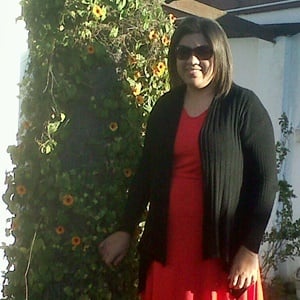
When Sharon Jackson decided to watch a movie at the cinema she was shocked when she couldn't find her seat in the dark.
The 25-year-old from Strandfontein was told by an ophthalmologist at the time that she would end up losing her sight and would never be able to pass Matric and follow her dream of studying for a HR Management Diploma.
However, with determination on her side, Jackson passed her exams and is set to start her tertiary education.
Read: How to safely fix your eye problems yourself
Jackson has retinitis pigmentosa and is one of a probable 150 000 South Africans with retinal conditions leading to loss of vision.
September is World Eye Care Month and includes World Retina Week that runs from 21 to 27 September. World Retina Week is observed in over 40 countries to create awareness of the progress towards treatment for retinal genetic conditions through scientific research.
Retina South Africa, a patient-run, voluntary organisation with branches in Gauteng, Eastern Cape and Western Cape, is at the forefront of raising funds for research to find a cure for retinal blindness and to support those suffering from retinal degenerative diseases.
"The remarkable progress being made in the fields of gene therapy, stem cells and artificial retinas makes the dream of treatment for as yet incurable blindness an exciting reality," Retina South Africa Western Cape said in a statement.
Read: Lasers could damage your eyes
"International clinical trials to find effective treatments are showing great promise and Retina South Africa is determined to bring these promising trials to South Africa."
Claudette Medefindt, Head of Science for Retina South Africa and Deputy President of Retina International said: “If we can bring promising treatments for retinal blindness to South Africa, we have the potential to save over a million blind years in our young people affected by these genetic conditions."
She said researchers are doing their part, exploring exciting new solutions to stop the advance of vision loss.
"These include gene therapy, artificial retinas, stem cells and many other innovative approaches. We need to do ours – to identify the thousands of young South Africans who could benefit from these exciting new initiatives. We need the support of all South Africans to make the dream of treating retinal blindness a reality in our lifetime.”
'Weak and lazy eyes'
Jackson said she didn’t know what was wrong with her, because since the age of eight years she needed to wear spectacles. "The optometrist said I had weak eyes, lazy eyes."
Read: Electronic devices with 'safe' screens can help to prevent eye damage
She said that already in Grade 7 she started having night vision loss. "I discovered this when I couldn’t find my seat in the cinema in the dark and bumped into the seats. I then went back to the optometrist who said this was normal for people with lazy eyes and gave me more spectacles.
"In Grade 10 I started losing focus and was unable to read a normal print; the words would jump around. I remember I wrote my English exam and the words were all over the lines. In Grade 11 and 12 I couldn’t read from the board, and a friend helped me by reading from the board. The teacher was unable to recognise that I had a problem."
Going blind
After seeing an ophthalmologist, who didn’t give a conclusive result, Jackson was told that her optical nerve was delayed and that she would eventually go blind.
"Another ophthalmologist diagnosed me with retinitis pigmentosa and on another visit to Groote Schuur Eye Clinic this diagnosis was confirmed."
Jackson then contacted Retina South Africa and Cape Town Society for the Blind (CTSB) where she found out about training and support for people with retinal disease.
Read: Gene therapy for blindness looks promising
"I have since done computer training, mobility training, life skills training and kitchen skills through CTSB. I am also an active member of the Retina SA WC committee, heading up the Youth Portfolio.
"With their help I applied to Damelin for an HR management course and was fortunate to receive a full scholarship to study this course next year. My self-confidence has grown immensely and I am looking forward to passing my HR Diploma."
Retina SA has partnered with the Human Genetics Division of the University of Cape Town, headed by Professor Raj Ramesar. Their work in identifying retinal genes is world-renowned and they are the only genetics unit in Sub-Saharan Africa practicing this cutting edge science.
One of their current projects led by Lisa Roberts’ PhD project involves new generation genetic testing of indigenous African patients with retinal diseases, and seeks to identify the genes involved in this population group. The project was kick-started with Roberts spending 6 weeks at the prestigious National Eye Institute in Washington, USA.
Read: What are those things floating in your eye?
A second project by Stacey Moses looks at a “disease in a dish” model of retinitis pigmentosa for her PhD, using induced pluripotent stem cells to study the biology of mutations in a dominantly inherited gene causing retinitis pigmentosa [RP]. Patients affected by this type of RP have a 50% chance [per pregnancy] of having an affected child.
As early diagnosis is imperative, Retina SA has partnered with Spec-Savers, who are offering free retinal screenings to the public 21 to 27 September.
Retina SA is also actively involved in fundraising projects to raise money for research and genetic testing for patients. They annually host events such as the “Dis-Chem Ride for Sight” and the SMS campaign where you can SMS the word “DREAM" to 38267 to donate R10 towards finding a cure for retinal blindness. You can also purchase a raffle ticket to win a Mazda 2 sponsored by the Fury Motor Group.
Also read:
Impotence drug no vision threat




 Publications
Publications
 Partners
Partners











